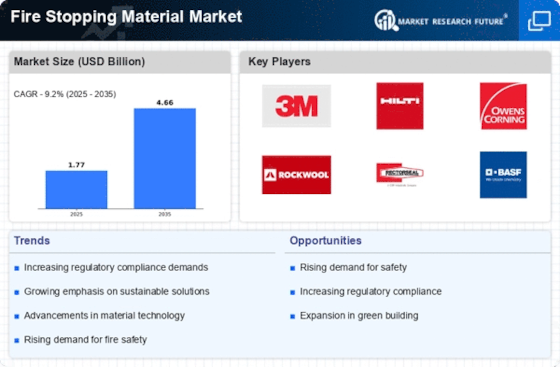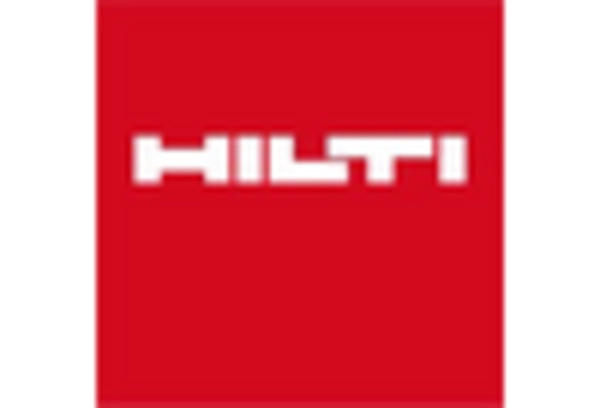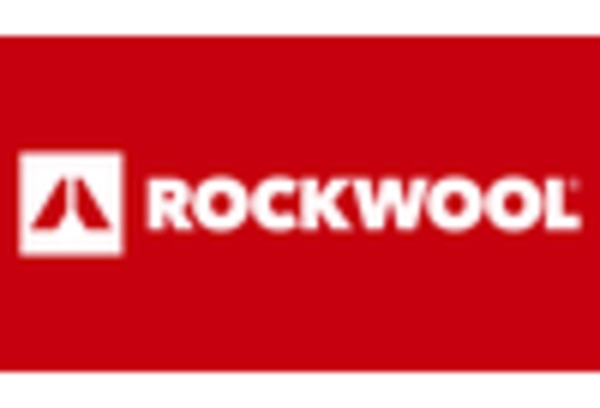Market Analysis
In-depth Analysis of Fire Stopping Material Market Industry Landscape
The market dynamics of fire stopping materials are influenced by various factors that impact supply, demand, pricing, and overall industry growth. One significant factor is the increasing stringency of building codes and regulations regarding fire safety. As governments and regulatory bodies implement stricter standards for construction materials and practices, there is a growing demand for effective fire stopping materials to enhance building safety and compliance.
Demand for fire-stopping materials is increasing in a wide range of sectors, including construction, oil and gas, transportation, and others. This will drive growth in the fire-stopping materials market. Also, with such factors as a growing global population and an ever-growing construction industry, it can be anticipated that the demand for more stopping materials will rise.
Furthermore, heightened awareness of the devastating consequences of fire incidents has prompted both public and private sectors to invest in fire protection measures, including fire stopping materials. This increased awareness and emphasis on fire safety have contributed to the expansion of the fire stopping material market.
Another driver of market growth is the booming construction industry, particularly in regions experiencing rapid urbanization and infrastructure development. As construction activity surges, the demand for fire stopping materials rises proportionally, as they are essential components in the construction of residential, commercial, industrial, and institutional buildings.
Additionally, technological advancements and innovations in fire stopping materials have led to the development of more efficient and cost-effective products. Manufacturers are continuously investing in research and development to enhance the performance, durability, and ease of installation of fire stopping materials, thereby driving market growth through product innovation.
On the supply side, the fire stopping material market is characterized by the presence of numerous manufacturers and suppliers competing for market share. This competitive landscape fosters innovation and drives manufacturers to differentiate their products through quality, performance, and pricing strategies.
Moreover, the distribution channels for fire stopping materials play a crucial role in market dynamics. The presence of efficient distribution networks, including wholesalers, retailers, and online platforms, facilitates the accessibility of fire stopping materials to contractors, builders, and end-users. Efficient distribution channels help in reducing lead times, minimizing inventory costs, and expanding market reach, thus fueling market growth.
However, the fire stopping material market also faces several challenges and constraints. One such challenge is the high cost associated with fire stopping materials, particularly those incorporating advanced technologies or specialized formulations. The relatively high upfront costs may deter some builders or contractors from investing in premium fire stopping solutions, especially in cost-sensitive construction projects.
Furthermore, the complexity of building codes and regulations governing fire safety standards can pose challenges for manufacturers and users of fire stopping materials. Compliance with ever-evolving regulatory requirements necessitates ongoing investment in research, testing, and certification processes, adding to the operational costs of manufacturers and potentially affecting product pricing.
Moreover, fluctuations in raw material prices, such as steel, intumescent compounds, and other chemical additives, can impact the production costs of fire stopping materials. Volatility in raw material prices may affect the pricing strategies of manufacturers and lead to fluctuations in market prices, influencing purchasing decisions and market dynamics.


















Leave a Comment